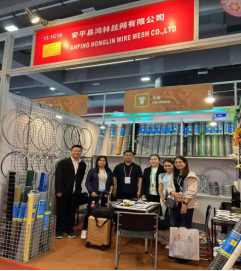welded wire mesh strength
Understanding the Strength of Welded Wire Mesh
Welded wire mesh is an essential material used in various construction and industrial applications, known for its remarkable strength and versatility. Composed of intersecting wires that are electrically welded at junctions, this durable mesh is utilized in everything from concrete reinforcement to animal enclosures. Understanding its strength characteristics can help users make informed decisions for their specific projects.
Composition and Manufacturing
Welded wire mesh is typically made from high-quality steel wires, which are cold drawn and then welded together at precise intervals. The mesh is available in various wire diameters and spacing configurations, allowing for adjustments based on load requirements and application needs. The quality of the steel and the precision of the welding process directly influence the overall strength and durability of the mesh.
Factors Affecting Strength
Several factors determine the strength of welded wire mesh, including wire diameter, spacing, and mesh grid patterns. Generally, a thicker wire will offer greater tensile strength and load-bearing capacity. Additionally, tighter spacing between wires can provide better support, particularly in applications involving heavy or concentrated loads.
Another crucial factor is the type of welding used in manufacturing. A strong weld joint is essential to the overall integrity of the mesh; if the welds are weak, the mesh can fail under stress. Various welding techniques, such as spot welding or resistance welding, may be employed, each with benefits depending on the intended use of the mesh.
Testing and Standards
welded wire mesh strength

To ensure its strength and safety, welded wire mesh is subjected to various testing standards. Organizations such as ASTM International set guidelines that manufacturers must follow to certify their products. These tests evaluate different characteristics, including tensile strength, weld shear strength, and the overall quality of materials used. Only products that meet these stringent standards are deemed suitable for structural applications.
Applications
The strength of welded wire mesh makes it a popular choice in various applications, including
1. Concrete Reinforcement In the construction of floors, slabs, and walls, welded wire mesh provides essential tensile strength, helping to prevent cracking and structural failure. 2. Fencing and Barriers Its durability makes it ideal for perimeter fencing around properties, agricultural applications, and industrial sectors.
3. Support Structures Welded wire mesh often serves as a framework in geotechnical engineering projects, such as retaining walls and slope stabilization.
4. Animal Enclosures Its combination of strength and flexibility allows for safe enclosures for livestock and pets.
Conclusion
In summary, the strength of welded wire mesh is a result of its material composition, manufacturing process, and adherence to strict testing standards. Its versatility and robustness make it a fundamental component in construction and industrial applications. By understanding the factors that influence its strength, users can select the right type of welded wire mesh that meets their project requirements, ensuring safety and efficiency in their builds. As industries continue to evolve, welded wire mesh remains a reliable solution across various fields.
-
Space-Saving Chain Fence Hacks Vertical Gardening with Cyclone MeshNewsJul.16,2025
-
Innovations in Iron Nail Wire Production for Modern ConstructionNewsJul.16,2025
-
Creative Uses of Wire Netting Fence in Modern Landscape DesignNewsJul.16,2025
-
Barbed Wire Fence Innovations in Anti-Climb TechnologyNewsJul.16,2025
-
Architectural Uses of Umbrella Nails for Aesthetic Roof DesignsNewsJul.16,2025
-
Architectural Uses of Razor Barbed Wire in Secure Urban DesignNewsJul.16,2025




